My Overly Conscious Love for Pathfinder
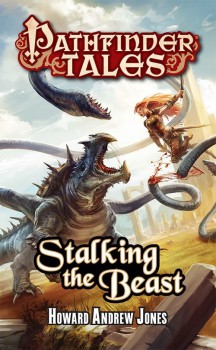 Lately I’ve been reading a fair amount of Pathfinder novels. Partly this is because I want to play Pathfinder and have no one with whom to play it, because all of my adult friends who are so inclined live too far away, and my children and I just aren’t in the same frame of mind. (Roleplaying with a fourteen-year-old and a twelve-year-old is challenging, simply because logic, for all involved, works a little differently. For this audience, a straightforward dungeon crawl, like Fantasy Flight’s Descent, is a more viable option, but, with that, you don’t get enough freedom for story creation and character generation.)
Lately I’ve been reading a fair amount of Pathfinder novels. Partly this is because I want to play Pathfinder and have no one with whom to play it, because all of my adult friends who are so inclined live too far away, and my children and I just aren’t in the same frame of mind. (Roleplaying with a fourteen-year-old and a twelve-year-old is challenging, simply because logic, for all involved, works a little differently. For this audience, a straightforward dungeon crawl, like Fantasy Flight’s Descent, is a more viable option, but, with that, you don’t get enough freedom for story creation and character generation.)
Another reason I have been reading Pathfinder novels is because my oldest son has started reading them. If I read them as well, we can inhabit a shared text (and perhaps, in time, a satisfying Pathfinder gaming session).
And yet another reason why I have been reading Pathfinder novels is because they’re good.
This was announced not too long ago, at least in reference to Howard Andrew Jones’s Stalking the Beast, when Nick Ozment realized that that novel was “better than it needed to be.” I’ve read some Pathfinder novels by other writers as well, and I will say that most of them are quite good.
Nick made clear why he found Jones’s second novel for the franchise so good, but what do I mean when I say that, in general, I like the series? I will say that they are highly satisfying Sword and Sorcery novels. They are entertaining. They are escapist. They have cool things in them. And, above all, they are quite familiar. They are based on the 3.5 (or 3.75) edition of Dungeons & Dragons, after all.
Yet I find that I’m a bit self-conscious about reading so many of these. Shouldn’t I (I frequently ask myself) be devoting more of my time – perhaps all of my time – to reading and thereby thinking the greatest thoughts of the greatest minds in history? If I read fantasy at all, shouldn’t I be reading the classics of the genre? Pathfinder novels are not all that “auteur” (if misplaced concern for originality and ownership should be the criteria with which we select our reading material). They’re industry novels. They’re franchise.
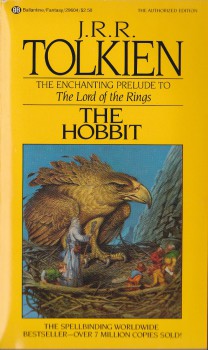
I have been a culture snob for about as long as I can remember. Sometime in fifth grade I discovered The Hobbit (I had been rereading The Chronicles of Narnia since the beginning of third grade). From there, as Tim Powers would say, my “dials were set.” Obviously, after I read The Hobbit (perhaps a dozen times), I rushed through The Lord of the Rings (and have since lost count of those rereads). By the middle of sixth grade I was gamemastering Middle-Earth Roleplaying (MERP).
I didn’t have many friends at school. I was the oldest child in my family and the second to oldest in my neighborhood. I had discovered the worlds of fantasy all on my own, and I had educated my neighborhood friends in how to play the pared down version of I.C.E.’s (Iron Crown Enterprise’s) Rolemaster that undergirded MERP, with many “house rules” deriving from youth and ignorance, obviously.
In time, however, I became aware of the D&D players at school. I didn’t have much to do with them. Not at first. I kept diffidently away. Of course they noticed some of my roleplaying accessories, perhaps my Angmar campaign module, or Southern Mirkwood (which vanished at school – I think someone stole it, and I felt worse that it was probably going to such complete non-use than that I had been violated in such a way).
“What’s that?” one of the D&D kids at last said about one of my accessories, which certainly had been “accidentally” displayed for his attention.
“What?”
“Middle-Earth Roleplaying.”
The rest of the D&D players gathered around.
“Oh, cool. Do you play Dungeons and Dragons?”
“No.”
And then I “educated” them. I described my perception that D&D was silly, infantile, a superficial amalgam of high fantasy concepts, whereas Middle-Earth was like a real world, internally consistent, literary.
My view of D&D had not been informed by much actual gameplay but through a zealot’s love of The Lord of the Rings and literary achievement.
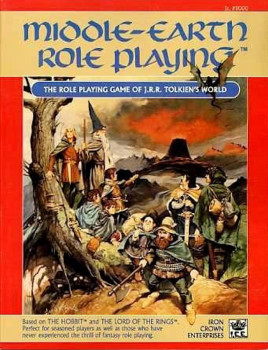 In fact, I wouldn’t ever really play D&D until I was a grown man, some time in my mid-20s. Someone cajoled me into joining a group, because he needed someone with roleplaying experience to guide a party of inexperienced players. Then, when this guy moved out of town, the party wanted to continue. So, naturally, I volunteered to take over as DM.
In fact, I wouldn’t ever really play D&D until I was a grown man, some time in my mid-20s. Someone cajoled me into joining a group, because he needed someone with roleplaying experience to guide a party of inexperienced players. Then, when this guy moved out of town, the party wanted to continue. So, naturally, I volunteered to take over as DM.
I will say that that year or so contained some of the best times I ever had roleplaying. I still didn’t really like the system (I tried once to get that group to switch to the Hero System, but an initial success didn’t last long. The group wanted to stick with what made them comfortable, what they knew.) In my youth (and my gaming, before my mid-20s renaissance, lasted specifically up to my junior year of high school, when I had moved away from my home town and opportunistically decided to transform my image into a rebel rather than a nerd) I not only played MERP but tried out Rolemaster and West End Games’s Star Wars (that was a sweet system!) and TORG: The Possibility Wars and Champions: The Super-Roleplaying Game (which resulted in some of my fondest memories concerning my two closest friends at that time – we in effect created our own superhero “universe”) and a few other curiosities like Toon and Teenage Mutant Ninja Turtles and a James Bond game.
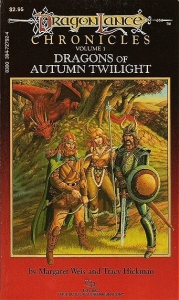 Even as an overly idealistic teenager, I did deign to read some of the novels being published by TSR at the time. I read (and enjoyed, though I don’t think I can get through them now) The Dragonlance Chronicles. I enjoyed Dragonlance Legends even more. When Forgotten Realms was released, I read Douglas Niles’s Moonshae Trilogy (and was swept away), and, like most anyone else into genre at this time, I read and enjoyed R.A. Salvatore’s Icewind Dale Trilogy. It is easy to say that these books are the progenitors to what we have today with the Pathfinder novels: these are all stories whose inner mechanics subscribe, overtly or not, to the mechanics of a roleplaying game, and they take place in a campaign world designed for the game. And they are franchise works: not the (at times) unique visions of unfettered artists. One might deride these works as industry pap. But there is one significant difference between the TSR novels and the Paizo novels: with very few exceptions, the Dragonlance and Forgotten Realms novels came in trilogies, a standard that was accidentally set by the WWII paper shortage that necessitated a trilogy out of Tolkien’s Lord of the Rings. Now, the Pathfinder novels are notably called “tales” – they are single, standalone stories (though characters certainly may appear in other novels).
Even as an overly idealistic teenager, I did deign to read some of the novels being published by TSR at the time. I read (and enjoyed, though I don’t think I can get through them now) The Dragonlance Chronicles. I enjoyed Dragonlance Legends even more. When Forgotten Realms was released, I read Douglas Niles’s Moonshae Trilogy (and was swept away), and, like most anyone else into genre at this time, I read and enjoyed R.A. Salvatore’s Icewind Dale Trilogy. It is easy to say that these books are the progenitors to what we have today with the Pathfinder novels: these are all stories whose inner mechanics subscribe, overtly or not, to the mechanics of a roleplaying game, and they take place in a campaign world designed for the game. And they are franchise works: not the (at times) unique visions of unfettered artists. One might deride these works as industry pap. But there is one significant difference between the TSR novels and the Paizo novels: with very few exceptions, the Dragonlance and Forgotten Realms novels came in trilogies, a standard that was accidentally set by the WWII paper shortage that necessitated a trilogy out of Tolkien’s Lord of the Rings. Now, the Pathfinder novels are notably called “tales” – they are single, standalone stories (though characters certainly may appear in other novels).
So, in this respect, TSR’s and then Wizard of the Coast’s format consciously or unconsciously followed the standard that was set by The Lord of the Rings, whereas one might say that Pathfinder adheres more to a pulp tradition – standalone stories that may nevertheless feature reappearing characters. This is further borne out, roughly, in the material of a Pathfinder tale. Though the characters in a TSR novel require gold and experience points, this isn’t their only concern; these characters usually get caught up into some quest versus a Dark Lord and the saving of an entire world (or a major portion of it). In contrast, the characters in Pathfinder novels are almost exclusively devoted to their own self-interests – and if part of that self-interest is ridding the world of some terrible demon (a la The Worldwound Gambit), then there you go. TSR novels seem to be more in the vein of high fantasy, whereas Paizo novels seem to accord more with the most prevalent definitions of Sword and Sorcery.
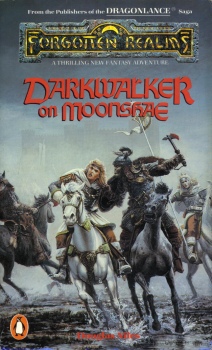 While we’re making comparisons, let’s point at something obvious that these two properties share. All of these books, with their worlds of fair Elves, savage Orcs, greedy Dwarves, and fleet-footed Halflings (or kender), trade in the trappings of derivative, traditional high fantasy. Now, some time ago there was a very involved discussion here that took umbrage against these clichéd fantasy tropes. While I don’t agree with all that was postulated in that essay, I understand the originator’s impulse, and it’s certainly one felt by some very popular and very talented high fantasy writers. Steven Erikson has said that the Forgotten Realms campaign setting is the only work of creativity that he ever felt like burning! (If you try to follow the link to the essay cited, scroll down to the second one on the page.) A fitting perspective to balance against this might come from an essay by Sherwood Smith, in which she argues for derivation because it’s something familiar and fantastical that people want to read. I would alter Gormley’s main thesis by arguing that people write this sort of thing not (necessarily) because they think it will sell (that is a cynical view indeed!) but because it’s what they want to write (and what people want to read).
While we’re making comparisons, let’s point at something obvious that these two properties share. All of these books, with their worlds of fair Elves, savage Orcs, greedy Dwarves, and fleet-footed Halflings (or kender), trade in the trappings of derivative, traditional high fantasy. Now, some time ago there was a very involved discussion here that took umbrage against these clichéd fantasy tropes. While I don’t agree with all that was postulated in that essay, I understand the originator’s impulse, and it’s certainly one felt by some very popular and very talented high fantasy writers. Steven Erikson has said that the Forgotten Realms campaign setting is the only work of creativity that he ever felt like burning! (If you try to follow the link to the essay cited, scroll down to the second one on the page.) A fitting perspective to balance against this might come from an essay by Sherwood Smith, in which she argues for derivation because it’s something familiar and fantastical that people want to read. I would alter Gormley’s main thesis by arguing that people write this sort of thing not (necessarily) because they think it will sell (that is a cynical view indeed!) but because it’s what they want to write (and what people want to read).
I have titled this essay “My Overly Conscious Love of Pathfinder,” and I believe I have been very conscious of it. Now let me try to justify what is so wonderful – nay, perhaps even literary – about the Pathfinder franchise. Pathfinder (and its progenitor, D&D) is nothing short of a combination of everything that is best in fantasy literature. It is well known that Gary Gygax took everything that he loved from all of his favorite writers and created, first, a system and, then, a world in which all of these things might consistently exist. It’s all there in Appendix N, all of Gygax’s favorite great works of the imagination, and every aspect of them find their ways into his game.
One of the things I agree with that Gormley may say is that fantasy has become derivative, sometimes nauseatingly so. Most high fantasists do imitate Tolkien, but most of them, as Smith would say, want to imitate Tolkien because Tolkien’s work is so good, because his world is so wonderful that these writers – not only readers – want to return to it again and again. These writers, the popularity of fan fiction aside, aren’t allowed to rewrite or extend The Lord of the Rings (something that Stephen King says most high fantasy does) in accordance with their own inspirations, so they try to add to the canvas by changing just one or two small things. They say something like, “I don’t know, maybe in this world Elves are all wild creatures of nature and kill anyone who hurts nature, or Orcs are misunderstood, or let’s just make a different mythic being a whole civilized race – Minotaurs, or Kelpies – and give them center stage, like Hobbits had in The Lord of the Rings.” Or they make up their own Peoples. And it must not be forgotten that people write this because they like it.
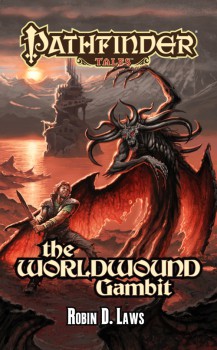 But my overly conscious love of Pathfinder suggests something possibly terrifying to me. What my love for Pathfinder whispers in my ear, as I’m reading one of those Pathfinder novels, is “should we write – or read – anything else?” This is because Pathfinder is, as I have already suggested, a brilliant synthesis of all that is best in fantasy literature. If one wants to read a Sword and Sorcery novel, which should be more attractive: a derivative trilogy in which a writer has made his or her statement on the genre by altering the rules or the emphases a bit, or a standalone tale set in a world that contains the best elements of Robert E. Howard, Fritz Leiber, Andre Norton, Michael Moorcock, H.P. Lovecraft, Roger Zelazny, and many more from inside or outside Appendix N? And if one wants to write, why bother trying to be “original?” We all know what we like, and we know that we like it all and that there is an industry that contains it all.
But my overly conscious love of Pathfinder suggests something possibly terrifying to me. What my love for Pathfinder whispers in my ear, as I’m reading one of those Pathfinder novels, is “should we write – or read – anything else?” This is because Pathfinder is, as I have already suggested, a brilliant synthesis of all that is best in fantasy literature. If one wants to read a Sword and Sorcery novel, which should be more attractive: a derivative trilogy in which a writer has made his or her statement on the genre by altering the rules or the emphases a bit, or a standalone tale set in a world that contains the best elements of Robert E. Howard, Fritz Leiber, Andre Norton, Michael Moorcock, H.P. Lovecraft, Roger Zelazny, and many more from inside or outside Appendix N? And if one wants to write, why bother trying to be “original?” We all know what we like, and we know that we like it all and that there is an industry that contains it all.
If this attitude strikes you as in any way imperialistic, then it should. Back when I reluctantly started DMing version three, I was very conscious that one of Wizards of the Coast’s aims with the d20 System’s open license agreement seemed to be to make its core rules essential to any future game or campaign setting, to make it more attractive for one to submit to Wizards’s property than to attempt something competitive. Now, one of Paizo’s promotional slogans is “Explore Your World!” But is it our world? Are we truly citizens in this diverse, polyglot culture, or are we the conquered, the subjugated, the marginalized?
My last observation is that Pathfinder has made the laudable move of using its Planet Stories imprint to offer, alongside its own brand-new Pathfinder novels, the overlooked classics of yesteryear, the foundations of the gaming industry, members and overlooked authors of Appendix N, writers like Leigh Brackett and Manly Wade Wellman and Robert Silverberg and A. Merritt. I want every single one of these books!
But I return to the beginning of my overly anxious concern. Today, a reader’s time is capital. It is valuable. It is property. On what should I be spending it? If not Pathfinder novels, Planet Stories? If not Planet Stories, on new, “original” works by non-industry writers? If one considers the common metaphor that reading is food for the mind, then one might admit that, quite often, genre reading is the lighter fare, the snacks or dessert of the mind. And, since we shouldn’t be ingesting too much dessert, and since this information age has flooded the market with a diverse array of inexpensive, corn-syrup-laden sweets, how do we choose?
But perhaps I’m just overly conscious. Perhaps I should ingest whatever I happen to fancy at the moment!
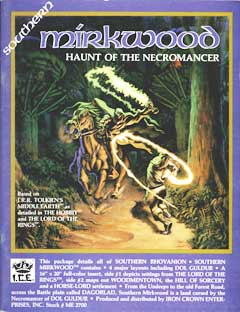
Thanks for the nod scott, shame you didnt agree with all my points, but fair enough not everyone did, and you were nice about it too, which is always good. Anyway, the more I reread the comments, the piece itself and the more I think about it, the more I start disagreeing with myself: more intelligent people then I have since made better points, and I think I should have approached the matter in a calmer, less cynical way, rather then the stark raving mad, almost angry way I did. If I were to do it again, I’d probably do it a lot differently. I’ve been kicking myself for a while, over this in all honesty.
I enjoyed the artidke, ive never read pathfinder, though, from what you say it sounds like a fully fledged guilty pleasure. And that’s fine, everones got a guilty pleasure, for everything, I think its justba matter of being aware what you should take seriously and what you shoukdnt, if that makes sense.
Sorry for the typos in that, by the way, I’m using a touchscreen. I suck with touchscreens.
I actually reread the original Dragonlance trilogy last year. (I still have my first edition with the red, blue & green Elmore covers — the only true covers.) Not great literature by any means, but they still held up. I’ve also enjoyed the three Pathfinder novels I’ve read, and plan to continue in the series at some point.
And I desperately wish they’d revive Planet Stories — they rescued some great stuff from undeserved obscurity.
Joe! They discontinued the Planet Stories???
(“Aha,” I say, nodding my head, “so that’s why that one volume on Thriftbooks was so much more than cover price.”)
And I have been dipping into Chronicles once in a while. I understand that it’s the Story that holds up, if not the writing. Both that and Legends, my favorite, touch on the borders of Myth. I tried to read other series by Weis and Hickman, but it seems to me, even at that young age, that few were as immersive and as numinous as those first two trilogies.
Connor, I wouldn’t overly regret your post! It certainly got a lot of attention (I wish anything I wrote would get half the attention that you got). And your essay is valid, as I attempted to show here, by detailing just how much thought someone like me (and you, I imagine) puts into justifying what I read. Or even the impulse to feel a NEED to justify. Barbarians must find us very silly! Indeed, there are few things we take as seriously as our entertainment.
I don’t know if I was around for the entirety of the discussion following your post, but, while I was there, you seemed to have been altering your views even then. Perhaps I should have returned to the comments to determine precisely where you ended up. But again, there’s little wrong with your views. I think the only aspect of your argument that I specifically disagree with is your suggestion that many writers write what they believe will sell.
Thanks for reading!
The Pathfinder Tales novels are just fabulous. I actually just nominated one for the Hugo Best Novel category and had a lot of the same emotions that Gabe is describing. Is it okay to do this? Is it even allowed? Shouldn’t I be supporting books that are less franchise?
But the fact is that one of the best novels I read in 2014 was a Pathfinder Tales novel. So I nominated it.
Dragonlance Chronicles was probably the first set of gaming tie-in novels that I ever read, but even when reading it as a teenager, it felt like I could almost hear the dice rolling in the background. Dragonlance Legends, on the other hand, I easily count among some of the most compelling fantasy literature I’ve ever read.
PlanetStories was a labor of love (I think for Erik Mona, but I may remember that wrong). But it was a difficult line financially and they had to move away from it.
Gabe: have you tried Play by Post at the Paizo site? When I got back into RPGing a few years ago, actual ‘sit down games’ weren’t feasible for several reasons. But I played in several PbP games through paizo.com and it was pretty enjoyable. And it fit my schedule.
Yeah, I assumed Planet Stories was only selling to me and about a dozen other folks, so I wasn’t necessarily surprised to see it kind of wither. And yep, it was Erik Mona’s baby.
I’m a fan of the Pathfinder Tales as well, with one exception: Ed Greenwood wrote one that was fabulously awful called The Wizard’s Mask. Other than that, the other half dozen or so I’ve read have been very enjoyable.
You know what, Gabe, you’re a cool guy. Glad you enjoyed it for the most part then, I do think I could have handled it a tad better though. Real shame about planet stories though; there was still so much more I was meaning to get from those guys. that does well and truly suck.
Ah, thanks for the warm fuzzies, Connor!
And I’ll certainly check out “play by post,” Bob! Thanks for the tip. That might be just my speed.
[…] final observation on this subject shall be overly personal. I have explained elsewhere that, in youth, I was an avid roleplayer, at first chiefly of Middle-Earth Roleplaying, and one of […]